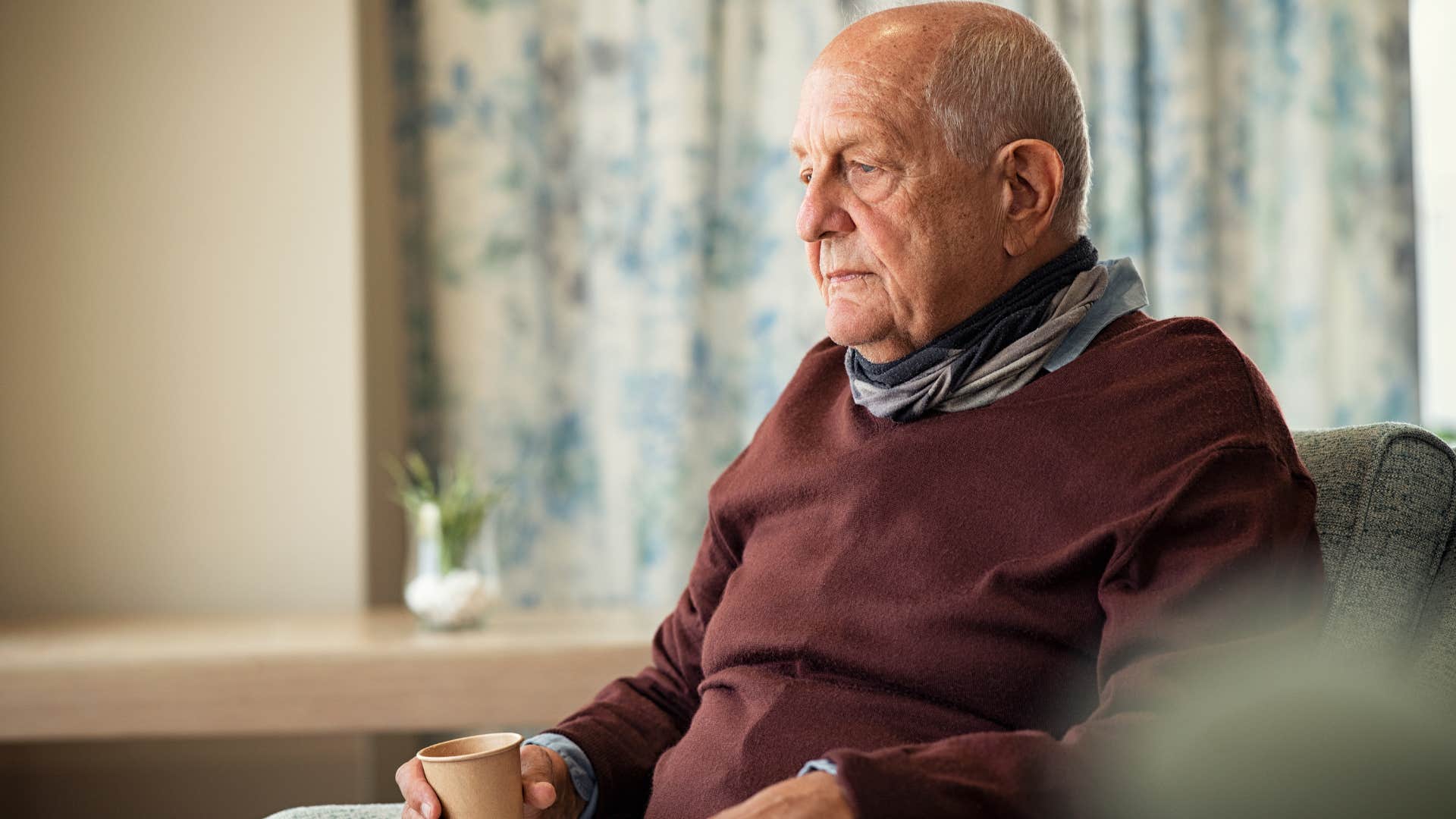11 Little Things Sad People Always Have In Their Homes That Most People Would Throw Out
They're incredibly subtle, but mean quite a lot to those who may be suffering in silence.
 PeopleImages.com - Yuri A | Shutterstock
PeopleImages.com - Yuri A | Shutterstock Many people struggling with depression are hyper-aware of how they're perceived by others in social interactions and situations, according to a study from the Journal of Affective Disorders Reports, encouraging them to isolate themselves to avoid feelings of shame, guilt, or embarrassment. However, when they're home and that veil comes down, the depressive habits, behaviors, and mindsets they default back to come into play — they don't have to pretend anymore.
Many of the little things sad people always have in their homes that most people would throw out are a direct result of their struggles with depression or chronic sadness. From seeking comfort to grappling with motivation and self-discipline issues, their homes are representative of the struggles they face on a daily basis and the experiences that may bring them a sense of solace amid the chaos.
Here are 11 little things sad people always have in their homes that most people would throw out
1. Clothes that don't fit
 Nicoleta Ionescu | Shutterstock
Nicoleta Ionescu | Shutterstock
Keeping clothing that doesn't fit in your home can sometimes be an innocent mistake, like a shirt you never wear or a pair of pants that you've outgrown. But for some people, these articles of clothing are representative of something much more harmful. "Goal clothes" — the clothes that don't fit, but serve as a reminder of your need to alter your body — can be incredibly misguided and toxic for people trying to adopt healthier habits.
According to therapist Rachel Goldberg, they actually almost always have an alternative effect — sabotaging progress and sparking frustration in people who keep them around, which is why they're one of the little things sad people always have in their homes that most people would throw out.
2. Unopened mail
 Kyrylo Ryzhov | Shutterstock
Kyrylo Ryzhov | Shutterstock
While the average person would just open their mail, sift through it, and throw away what they don't need, these are some of the simple daily tasks that sad people struggling with unresolved trauma, anxiety, or attention struggle to get through. Things like opening their mail are difficult, so they tend to let letters, bills, and sometimes packages pile up in unsuspecting corners of their home.
From being nervous about a response, to fearing the financial anxiety of a new bill, and even struggling with action fatigue from mental health concerns, there's many reasons why unopened mail is often one of the little things sad people always have in their homes that most people would check and throw out.
3. Unnecessary clutter
 Lysenko Andrii | Shutterstock
Lysenko Andrii | Shutterstock
According to marriage and family therapist Gaby Teresa, struggling with depression can make finding the motivation to clean in your living space or manage clutter much harder than it is for the average person.
The lingering sense of hopelessness and lack of motivation can make unnecessary clutter pile up, further contributing to a cycle of internal chaos and struggle. Even if it starts with a few things here and there, sad people won't throw these items out despite taking up physical space and affecting their mental health.
4. Broken sentimental items
 Ground Picture | Shutterstock
Ground Picture | Shutterstock
From broken jewelry to worn family photos, for some, these items are a reminder of the past — every time they see these items they're sucked back into a cycle of rehashing the past and feeling a sense of nostalgia that's not always productive.
According to psychology expert Aleksandra Eriksen Isham, it can feel impossible to overcome the nostalgia that's sparked from these sentimental items, no matter how toxic, anxiety-inducing, or sad it feels. They hold onto these items to feel something, even if that experience is marked by self-criticism, shame, or regret.
5. Dead plants
 Okrasiuk | Shutterstock
Okrasiuk | Shutterstock
Even if it seems subtle and innocent, keeping dead or dying plants at home can bring a lot of unnecessarily bad energy into your space. They serve as a reminder of something that wasn't cared for or nurtured, reminding people struggling with motivation of a project or living thing that they weren't able to consistently prioritize.
When you make the time to prioritize caring for and nurturing plants, there are a number of psychological and mental health benefits that follow, but when they're left neglected, it can sabotage the energy of a living space.
For the average person, throwing these plants away and replacing them is the next step, but for people struggling with depression or chronic sadness, they may seek out the negative emotions associated with these plants in their home, sparking emotions that they know how to navigate and feel, and letting them linger for longer than they should.
6. Old journals
 PeopleImages.com - Yuri A | Shutterstock
PeopleImages.com - Yuri A | Shutterstock
Reading old journals can be helpful sometimes, but for people with traumatic or sad entries, it can be harmful to their emotional and mental well-being, according to life coach Patricia Bonnard. It not only brings up a lot of painful memories and experiences they might have already forgotten about or resolved, it can keep them leaning on the past — reminiscing, feeling regret, and grappling with depressive nostalgia.
They're one of the little things sad people always have in their homes that most people would throw out, because even if they're completely aware of it, they tend to yearn for the nostalgia that sparks more negative emotions. They know how to handle being sad, even if it's uncomfortable and isolating, so sparking more depressive thoughts and experiences feels like a means of control.
7. Childhood toys
 bbernard | Shutterstock
bbernard | Shutterstock
Childhood toys and old sentimental items, no matter how worn out they are, are some of the little things sad people always have in their homes that most people would throw out. Whether they're truly comforting or an object of depressive nostalgia is another discussion, for the most part, they're held onto by people looking for a sense of control and security in their lives.
According to a study from the Journal of Affective Disorders, these comfort items don't always have to look like stuffed animals or scented candles, they can also be more unsuspecting things like fast food and unhealthy vices. Anything that brings comfort to a person struggling with emotional turmoil at home — whether it's healthy or not — may also be some of the little things they hold onto for longer than the average person.
8. Old decorations from holidays or birthdays
 Olha Nosova | Shutterstock
Olha Nosova | Shutterstock
Old decorations from holidays and birthdays hold a lot of emotional value and memories, which is why they're hard to get rid of, especially for people struggling with sadness or depression that tend to cling onto clutter and items that can be comforting at times.
Even if they're unusable — for their true purpose — they can be comforting for people struggling with sadness at times, reminding them of positive memories and people.
9. Burnt-out light bulbs
 New Africa | Shutterstock
New Africa | Shutterstock
Even if they notice a light burnt out in their house, a person struggling with chronic sadness or depression may not be able to work up the motivation — or rather, the self-discipline — to actually replace it and throw the old one away.
According to a study from Phenomenology and the Cognitive Sciences, it's not uncommon for this lack of motivation to keep people from breaking the cycle of depression and forming better habits, even if it's something as simple as completing household repairs.
10. Unused exercise equipment
 Jestercine | Shutterstock
Jestercine | Shutterstock
While exercise and movements of the physical body are shown to help combat depression and alleviate the burdens people struggling with chronic sadness face, according to a Nature study, finding the motivation to actually engage in these habits is difficult.
They don't have the motivation or determination to act, even if they have a million goals and aspirations in their mind. It's part of the reason why items like this, along with clutter and spoiled food, are present in the homes of sad people.
11. Outdated or spoiled food
 F01 Photo | Shutterstock
F01 Photo | Shutterstock
Spoiled food and outdated things tend to pile up in a depressed person's home, not because they don't always notice it, but because they don't have the motivation to get rid of it.
People feeling sad and depressed tend to crave sugar and processed foods when they're feeling down, which is part of the reason the food in their fridge tends to go bad — they're eating out or ordering in more than the average person, so they may not even notice when spoiled food piles up.
The comfort food that drives them to spend more and divert nutrition in their diet can further amplify the feelings of sadness they experience, driving them even deeper into a cycle of lacking motivation, emotional turmoil, and depression.
Zayda Slabbekoorn is a staff writer with a bachelor’s degree in social relations & policy and gender studies who focuses on psychology, relationships, self-help, and human interest stories.

